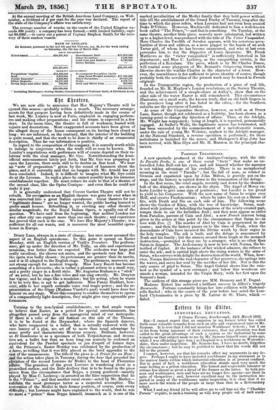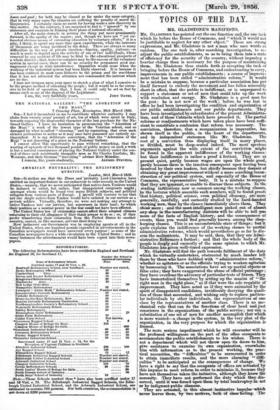Itittri to t4t Chan.
INDUSTRIAL EDUCATION.
2 Crown Terrace, Scarborough, 24th March 1856. Sin—I cannot regret that an omission in my former letter has called forth some valuable remarks from such an able and experienced man as Mr. Symons. It is true that I did not mention Workhouse Schools ; but I am so far from being ignorant of their existence, that my attention was first called to the great advantage of such a system as the Industrial by some remarks on that subject made to me by Mr. Symons himself some years ago, while I was officiating' (pro tom.) as Chaplain to a workhouse in W orcester- shire, then under inspection. Mr. Symons has, I have no doubt, forgotten the circumstance ; but he may be gratified to know that his words did not fall to the ground. .-
I cannot, however, i
see that his remarks affect my arguments in any de- gree. Perhaps I ought to have included workhouses in my statement as to the narrow limits within which industrial education is at present confined. But in point of fact, a workhouse education stands upon very much the same footing as a prison education. The honest and respectable labourer or artisan has almost as great a dread of the former as the latter. In both pri- sons and workhouses, men and boys are no longer free agents—are there in spite of themselves• and, however excellent may be the instruction im- parted in many of the workhouses under inspection, it is clear that it no more meets the wants of the people at large than that in a Reformatory school.
What I and my friend (if he will allow me to call him so) the " Cheshire Parson" require, is such a training as will keep people out of both work- house and gaol ; for both may be classed so far ender the same category, that in very many cases the inmates are suffering the penalty of moral de- linquencies. I certainly claim no merit for having made a new discovery m this matter. On the contrary, I am surprised to find it " ignored" by our statesmen and essayists in framing their plans of national education. After all, the main obstacle in getting the thing put more prominently forward, is the apathy of the masses ; and, though we have not " yet ex- -granted obvious means of extending education by voluntary efforts," it is a pity, think, to spend any more time upon experiments, while the interests of thousands are being sacrificed by the delay. There are always so many difficulties in the way of private exertion—bigotry, apathyy,jealousy—so much is made to depend upon the activity of one or two individuals, whose removal by any accident of life may be fatal to the educational prospects of a whole district—that, however complete may be-the success of the voluntary system in special cases, there can be no security for permanent good ma- nagement except in state interference. Opposition would cease when the working of the industrial system had been fairly observed. It is because it has been confined in most cases hitherto to the prison and the workhouse that it has not attracted the attention nor commanded the interest which are its due.
I dare not trespass upon your space to sketch a plan of what I conceive to be the proper method of educating the people ; but it would be so far exten- sive in its field of operation, that, I fear it could only be set on foot by means such as are at the disposal of the Legislature.



























 Previous page
Previous page